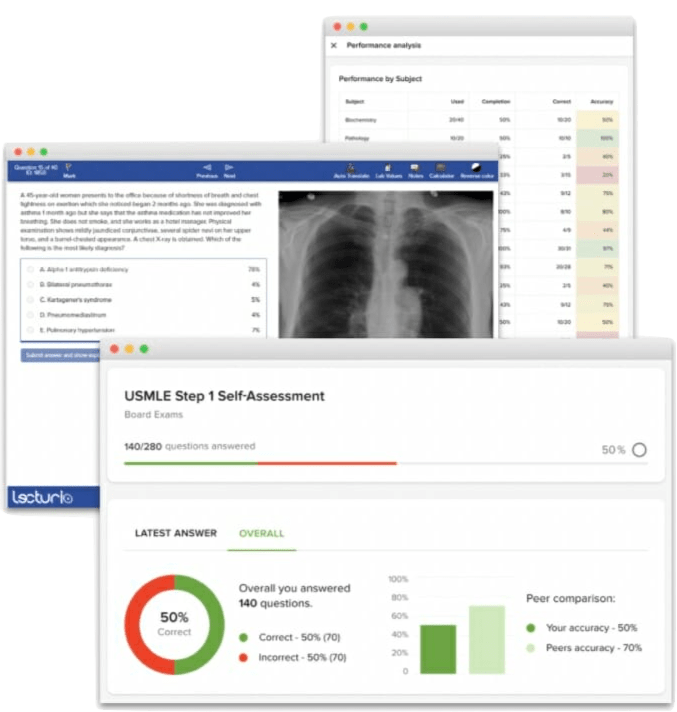This article will talk about how to become eligible for the MCAT and what to prepare before taking it. But first, to properly tackle a challenge, you need to understand what it is. So, let’s talk about the MCAT itself!
What is the MCAT?
The MCAT is a multiple-choice test that assesses the readiness of students who want to enter both Allopathic M.D. and Osteopathic D.O. programs in the United States, Australia, Canada, and the Caribbean Islands. Since 2007, it has switched from being a pencil-and-paper exam to a computer-based one.
The test itself takes 7.5 hours to complete with four sections, administered in the following order of topics:
- Chemical and Physical Foundations of Biological Systems
- Critical Analysis and Reasoning Skills (CARS)
- Biological and Biochemical Foundations of Living Systems
- Psychological, Social and Biological Foundations of Behavior
Who can take the MCAT?
Your eligibility to take the MCAT primarily hinges on your intention to attend health-related programs for degrees such as doctor of medicine, doctor of osteopathic medicine, doctor of podiatric medicine, and veterinary medicine. However, the programs that may require MCAT scores are not limited to these.
What subjects should I take before the MCAT?
There are no particular subjects that you must take to be eligible for the MCAT. However, schools do require prerequisite subjects to be admitted. So have a target school in mind and make sure you have their required units done, or plan to finish them, during your pre-med studies.
Do I need to take a prep course for the MCAT?
This depends on how you learn best. You can pass the MCAT with self-study, using books and other MCAT resources. However, if that doesn’t work for you and you prefer more guidance, then you should consider taking a prep course. Many students find it hard to sift through YouTube videos and other free content because there’s no particular consistency in teaching strategies. So you may find that prep courses will provide the structure and consistency you need to master the MCAT coverage.
However, the bottom line is you don’t need a prep course. It’s not a requirement for the MCAT. It’s simply an ideal option for those who want a more structured review.

Raise Your MCAT® Score and Increase Your Chances of Acceptance
with Lecturio
Registering for the MCAT
The MCAT is administered by the Association of American Medical Colleges. To register, you’ll have to create an account on their site. From there, you’ll receive your AAMC-accepted ID and account username, which are needed to register for the exam. Your ID and account must have the same name. If your name changes in between registration and your exam date (e.g., due to marriage), you have to update your IDs and inform AAMC. You can find the requirements for the ID on their site, but here they are for easier access:
- Must be issued by a government agency
- The expiration date of the ID must be printed on it
- Your ID must be valid, i.e., not expired by the time you take the exam. Otherwise, you need to have it updated.
- The photo should be a recent photo of you to positively identify you
- Must be tangible and whole, in other words, it should be undamaged to make sure it’s untampered with
- Must be in English
The forms that you need to fill out are available online when you register for the MCAT. Aside from having the proper ID, there are no other prerequisite documents needed to register. Of course, you will need other documents for the actual application process to medical school, but that’s another topic for another day.
You also need to prepare a fee to pay for the MCAT which, at the time of writing this article, is about $330 for the initial registration. This doesn’t include application fees to medical schools.
“Unofficial” prerequisites before taking the MCAT
When I say “unofficial” prerequisites, I mean the steps you should consider before taking the MCAT, even though they aren’t strictly required. These are things that I highly recommend before registering and taking the MCAT.
#1: Strategize your pre-med path
If you plan to go to medical school, start planning early. There’s no required pre-med program to take the MCAT. You could be a liberal arts major and still do well. However, schools do require you to have pre-requisite courses that cover the 4 sections of the MCAT. So if you’re not willing to overload on your units or take extra classes, you might as well take a more health-related course.
It helps to take traditional pre-med courses because the way you study for biological sciences is different from other subjects. Hence, if you’re used to studying medical-related subjects, you’ll likely find it easier to study for the MCAT. If you want to take a non-traditional pre-med, then I suggest you still try to familiarize yourself with efficient study techniques specific to the biological sciences. Which brings me to the next part…
#2: Prepare your MCAT resources
Whether you’re taking a prep course for the MCAT or not, you’ll need a resource to follow. It’s easier to study when you have a structured study schedule and outline. It just helps pace your studying better so that you’re not overwhelmed and you’re sure that you’re covering everything you need to know. AAMC has its own resources if you want to self-study the topics for the MCAT.
If you’re not sure where to start, Lecturio has an MCAT course with flashcards, videos, and quizzes. This course is very structured and works with pretty much any study strategy you have because of all the resources they have available for each topic. Their approach uses diverse study strategies including techniques to help retain what you learn in the long run.
#3: Sit and think if this is what you want
Studying for the MCAT is mentally, physically, and financially draining. You’ll be studying late at night. You’ll sacrifice time for yourself and people you care about. You’ll also be paying fees to take the exam, traveling to your testing site, and applying to medical school after. You need to think if the investments you make into taking the MCAT (and going to medical school) are worth it for you. Ask medical students and doctors what their experience is like and ask yourself if that’s the life you want for yourself.
I understand it can seem overwhelming to plan everything far ahead, but once you pass the MCAT, you will have invested a lot of time and money by that point. Sunk-cost bias will eventually set in and you’ll think that your next step has to be medical school (or whichever medical-related program you’re planning to take). As a result, even if you think this path is no longer for you, you’ll think you can’t quit.
Understand that commitment doesn’t mean confinement.
Instead, start with the mindset that medicine is what you want in life right now, but if you change your mind, you’re allowed to back out even after passing the MCAT. Also prepare for the possibility that you may not get the scores you want, despite having put in all the effort to pass.
#4: Prepare well the day before your exam
First, pack your MCAT-accepted ID. Without this, you won’t be able to take the exam. Next, pack food and drinks to keep in your locker at the testing site. You’ll need all the energy you can get. Sleep well the night before so that you can arrive at your exam site at least 30 minutes before the exam starts. Ask someone to wake you up the next day so that you won’t oversleep.
Lastly, I understand how tempting it can be to cram everything the day before and to sacrifice time for relaxing and sleep to do that. But I would advise against it. It can cause fatigue and being tired is the last thing you want to be when taking the MCAT. You should enter the exam knowing that you did your best to review for it beforehand. Instead, use the day before the exam to relax and collect your thoughts. You got this!




